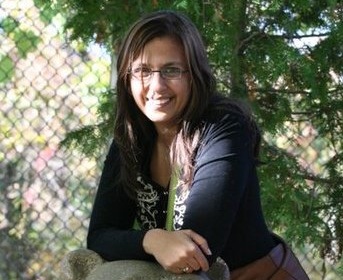In the Spotlight: Sonal Champsee

Sonal Champsee has always impressed me with her creative practicality. From the moment I met her, I knew that she’d made a choice – she’d chosen writing – and that there was a great deal of power in her choice. You could just feel it when she sat down at the table: she was going to do this. She was joyful, but she was also serious.
In our class, I would offer writers a variety of prompts, trying to help them provoke something out of nothing. And Sonal’s writing responded especially to prompts that required attention to form or structure. Of course now I know she has a background in Computer Science and Rhetoric, so this makes sense. The restrictions in those exercises may have given the logical, sensible side of her brain something to accomplish while the rest of her creative mind could work freely.
Her writing shows careful interest in emotional truth, love, communication, and honest human interaction. I’m very happy to introduce you to Sonal and her writing process.

Meet Sonal
Sonal Champsee is a Toronto-based writer who is currently working towards an MFA in Creative Writing through the UBC optional residency program. Sonal has undergraduate degrees in Rhetoric and in Computer Science, and has worked as a programmer, marketing manager, marketing communications writer and as a landlord and real estate investor. She has not yet been published, but her work has garnered some very impressive rejections. Learn more about Sonal.
Handwriting or computer?
First draft computer. Difficult parts re-written by hand.
Page count or time count?
Neither. Word count.
First drafts or revision?
First drafts until I get over my revise-o-phobia.
Writing solo, writing partner, or writing group?
Solo and group.
Earplugs/quiet or headphones/music?
Both. Depends what I'm writing.
How long have you been writing? How long have you known you wanted to be a writer?
I've been a reader since I was four. But it never occurred to me that I could also be a writer until I was fourteen, and my English teacher apologized to me because she thought my short story was really good so she read it out loud to the earlier class without getting my permission first. (Not that I'd have said no.) That's when I first thought, maybe I can do this. I never got very far with it though, and then when I entered university I decided to take an employable degree. This was a huge mistake. I believed I would be able to graduate, get a good job and still write after work, but I was only partially right; I graduated, went on to a number of well-paying and soul-sucking jobs, and whatever haphazard attempts I made at writing evaporated. This was my life for years. I was miserable and tried to convince myself that I was merely being practical.
About seven years ago, amid some personal crisis, I rediscovered art-making and writing. I remember taking my first creative writing class at Humber College, and feeling this awed clarity, this sense that everything fit. I had lunch with friends the next day and asked "Do you know that feeling you get, when you know absolutely that you are doing the thing you are meant to do?" They looked at each other and then and me and said "No, I have no idea what you are talking about, but it sounds pretty awesome."
For me, it's not so much about wanting to be a writer as it is that writing is the thing that feeds my soul and grounds me the most in myself. Practical and sensible are bad habits I am trying to break. It sounds arrogant and pretentious to say that I have to write, or that I'm meant to write, but I believe this is true. My world is all wonky when I don't. So I write. None of this means that I'm meant to be a good writer or a successful writer, but I keep working on those things.
How do you make time for your writing practice? How do you handle resistance?
I am terrible at making time for my writing practice, even though writing makes me happy. Conventional writerly wisdom says I need to set aside time to write daily; this does not seem to work for me. I struggle with routine. I have never been able to successfully get into the habit of doing anything deliberately. (Accidentally, however, I have formed many bad habits.) I have proven that whole "It takes 21 days to form a habit" thing wrong over and over.
I used to think this meant I was not serious enough about writing, but I now suspect that I am simply not built for even, placid, routine. This means I don't have to be hard on myself for not meeting some standard about what 'real' writers do. I have to find another way, to keep going in fits and starts, to keep inventing new tricks to make myself write, and hope will coalesce into something that happens more often. Some people have structured plans to run marathons; others are just active in a dozen different ways.
It's hard to sit and write. I sit down, and suddenly I am starving and cannot concentrate so I have to go cook and eat something. Then I sit back down, but a few moments later I am hungry again. Or I notice that I've been living in furry squalor for a while now, and it's suddenly intolerable. (Clearly, writing is good for my housekeeping habits.) I write a few words, but decide to fact-check something on the internet and lose hours. It gets late, I get tired, I get five hundred words down and then I don't know what comes next. I could push myself a little farther and write further into the unknown. If I just sit and type a little longer, the story will reveal something new. Magic will happen if I just keep going. I regret all the times I walk away.
Yet, twice I completed the Nanowrimo challenge, writing at least 2,000 words a day, every day, for a month. They were mostly awful terrible words, but magic did happen now and then. And I worked and saw friends and went to the theatre and fed myself and even managed to clean once in a while.
So I know I can make the time. I know what can happen when I make time. But still I do not make the time.
The MFA is my latest trick. I had originally planned to do this part-time, but then realized that part-time would keep writing as something I did on the side. So I signed up for a full-time course load, and hope that the sheer volume of work will push me to find a way to make writing the centre of my life and work something I (mentally) do on the side. I have changed nothing so far about my crazy stress-laden life to accommodate this. I'm diving in deep water and will just have to figure out how to swim later.
Tell us about the excerpt you're sharing today.
This is a very early draft of a story I've been working on. I actually wrote this piece from one of Sarah's prompts, although the prompt-part was not working and so I cut that. The entire story takes place at a speed-dating event.
For me, the most interesting part of this story is that this is one of the biggest revisions I have ever done. I took Kevin's actions and gave them to Avani, which meant I had to re-write nearly everything. I've always been terrified of having to re-write everything; it took so much work just to get that first draft, and I thought re-writing meant twice the work. In fact, it's less work, and certainly a lot easier revising draft after frustrated draft until I hate the story because it just won't work.
I'm still playing with whose point of view to write this from, still thinking of giving Avani's actions back to Kevin and writing from his point of view, still thinking of writing this in multiple views. For a revise-o-phobic, thoughts like these are practically heresy, but only when I kick fear out of the way will I be able to see where this story will take me.
Excerpt from "No Harm" by Sonal Champsee
A man was settling himself in front of Avani, blue sheet in hand. He had the red-undertoned skin of someone who sweated easily. “Hi,” he said. “I’m Dave. And you are?”
She glanced over at Kevin, but he was talking to the red-haired girl again. Avani leaned forward a little to stick out the nametag on her chest. “Avani,” she said. “A-V-A-N-I.” She wrote his name on her green sheet.
He wrote busily, repeating each letter under his breath. “That’s a really pretty name. Is it Ind— I mean, are you— uh, is it from your heritage?”
“Yes,” she said. “I’m Indian.”
“When did you come to Canada?”
“I was born here.”
“Oh.” The chatter in the room swelled as other people’s conversations began to flow. “You know, I think Indian women are really beautiful. I’ve always wanted to date one. They just look so exotic.”
Avani looked over at the girl in front of Kevin, with her ivory skin and jewel-toned clothes, and persimmon hair. She looked down her crisp floral blouse and white pants. She looked like clean, fresh laundry. There was nothing exotic about laundry.
“And I love curry.”
“I don’t really eat much curry.” She hadn’t since her parents went back to India.
They sat without speaking in the chatter-filled room. Avani tried to count the tables around the room, to calculate how long it would be until she could talk to Kevin. He wasn’t looking her way at all. But the red-haired girl was twisting a lock of hair around her finger.
“What do you do for a living?” asked Dave.
“I’m a pharmacist.”
Dave waited a moment and then said: “I work for a bank.” Avani said nothing, so Dave continued. “Yeah, most people usually ask me if that means I know a lot about money, but all I know is how fast it runs out every month. Ha ha.” He tapped his fingers against his blue sheet on the fake wood table. “So pharmacy, eh? Do you get lots of junkies and stuff coming in and trying to get drugs?”
“Not really.”
“What about hobbies? What do you do on the weekends and stuff?”
“I don’t know,” Avani thought about her recent weekends. She hadn’t felt up to much more than watching re-runs of Millionaire Matchmaker. “Um, we used to go hiking a lot.”
“We?”
“My ex. And me. He used to take me hiking. And stuff like that.”
“Do you still hike?”
“No.” Avani wondered if the red-haired girl was a hiker. Or would she introduce Kevin to something new, instead of following him around like his loyal puppy?
Dave checked his watch. “Was this a recent break up?”
“Yeah. Well, maybe not, but it feels recent. Three months. Is that still recent?”
“I guess so,” said Dave. “So what are you doing here?”
“He’s here.”
“What?”
“I Facebook-stalked. I saw he was coming, and I really needed to talk to him. So I’m here.”
Discussion:
What remains with you after reading Sonal's work?
Can you articulate what's working in this excerpt - and more importantly, why it's working?
How is your own writing practice like Sonal's? How is it different?
Please leave a comment below.
And thank you, Sonal!
Photo credit (top): Skye Studios on Unsplash.

16 comments
Leave a comment